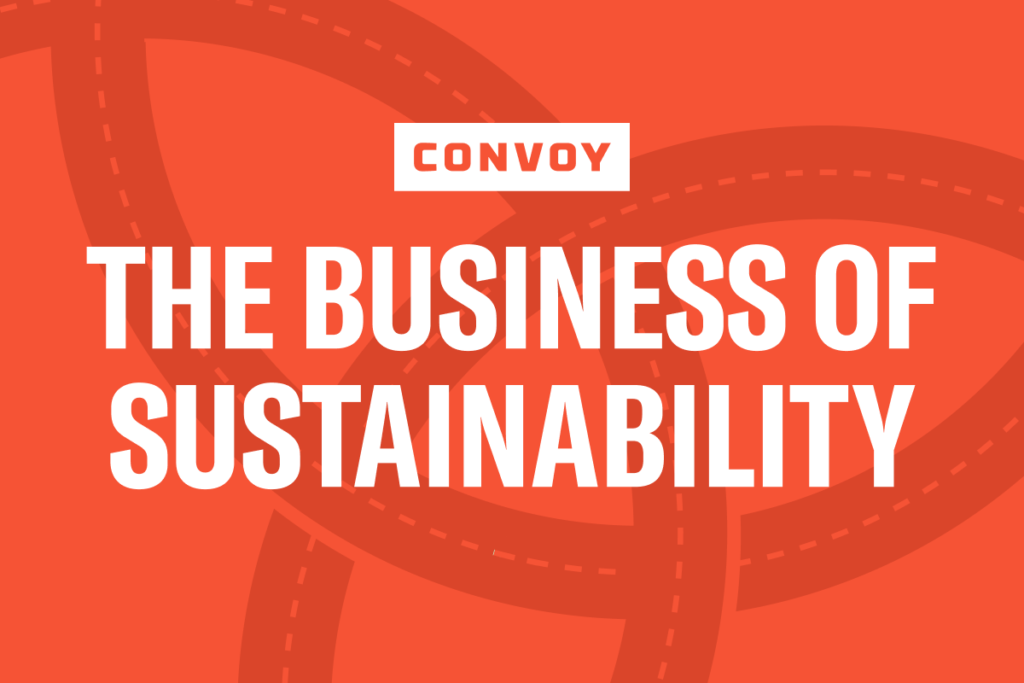How The Consumer Is Leading The Sustainability Charge
Sustainability • Published on April 19, 2021

Sustainability is, undoubtedly, top of mind for many stakeholders — not the least of which is the consumer. More and more consumers are, in fact, realizing they can vote with their wallets by supporting the companies and organizations who are doing the right thing for people and the planet. And companies around the world are taking notice as they see consumers are actually willing to either buy products or even spend a bit more on a product or service because it is more sustainably made than the competition.
Throughout our Business of Sustainability interview series many of our guests mentioned consumers are demanding sustainable practices from the companies they do business with. Convoy also published a “The State of Sustainability In The Trucking Industry” report where we found that 50% of respondents said “customers are the primary driving force for our commitment to sustainability.” Here is a roundup of what our guests had to say.
- Consumers Want To Live Their Value Through Their Purchases. Kimberley Sundy, Director, Corporate Sustainability at Kellogg Company, notes “Consumers and people want to live their values through their purchases and this has become all the more apparent during COVID. We really try to make sure our portfolio resonates with consumers the entire world over. We know sustainability is a reputational driver. Our portfolio at Kellogg is 86% plant based, and when you think about the value of sustainability, it plays a really critical and important role and it really does touch consumers at every level. Shoppers are demanding transparency and accountability. They want to know where their foods come from.”
- Customers Want Assurances They Are Buying Sustainably Sourced Products. Zach Freeze, Senior Director, Strategic Initiatives, Sustainability at Walmart reports, “Walmart has this commitment to everyday low cost — which has really been a foundational principle of the company — and we’ve really taken that and talk about it now as true everyday low cost. So, the true cost of that product takes into consideration what we buy and source. We work with our suppliers to minimize that as much as we can and keep all the externalities in the context to make sure we stay focused on getting to zero waste and zero emissions and be able to be very proud about the products we sell and what we put on our shelves. Ultimately, we want to build trust with our customer. We want our customer to feel really good about coming into Walmart and buying any product they need, and we want to do that in a sustainable way.”
- Customers Really Do Want To Learn More About Sustainability Initiatives. Bryan Paper, CEO at Miir points out that “Customers can see the nonprofits we are granting toward, the metrics, and how we look at empowerment and what that looks like. It is all about transparency for us. Inviting our customers to come along on the journey is incredibly important. Our goal is to be a bridge between the individual consumer as well as the nonprofit partner. Customers being along on the journey is not just a marketing concept. We really mean what we say and we’re really serious about empowerment. Our goal is that our consumers do become involved with these incredible nonprofits and if we can be that conduit through the purchase of a product, awesome.”
- Educating consumers about sustainability is valuable for them. Jeff Smith, Vice President of Sustainability at Six Senses Hotels, Resorts, Spas admits “Part of our aim is to capture our guests’ interests. It is a great opportunity when they are on vacation with their minds relaxed and open to new ideas. They ask “what are you doing with your glass bottles back there?”, and we actually do workshops around this so we invite them to come and learn what we do with our glass bottles. At one property we crush our bottles and make new things. We do upcycling at our resorts and we like to involve guests in that. Some guests arrive not knowing what we do, but ideally every guest leaves at least being aware of what we’re doing to ensure that their stay has been the lowest impact possible, the lowest negative impact but also a positive impact on our community’s environment. We are in an industry of providing experiences, so we try to draw it all together and hopefully we’ve equipped our guests with some tips they can take back home or we have inspired them to live a slightly more sustainable lifestyle when they go on with their lives back home.”
- It is important to continue to encourage consumer involvement and activism. Nira Johri, Director of Global Diversity and Sustainability at Rich Products Corporation believes “It is really important to understand the actions of the brands you are supporting and what they mean. Consumers need to really understand the businesses they buy from, because your dollars are one of the most important ways you can represent your values. It is also important to vote and be civically engaged. Your voice and your vote enable policies to be made at a federal, state, or local level to support those initiatives. We can do a lot from the private sector perspective, but we absolutely need our government to partner with us and work together to implement the change we are looking for in the long term.”
- Consumers will pay a premium for sustainable products. Gretchen Grani, Regeneration & Sustainability Lead at Guayaki Yerba Mate co adds, “There is a lot of evidence that sustainable brands have a premium market value. This is being driven by consumers who want to make an impact with their purchases and look for mission-driven companies. Additionally, this year we witnessed consumers step up and demand corporations support Black Lives Matter and offer diversity and inclusion programs.”
- Sustainability should be second nature for many companies. Angela Hultberg, Head of Sustainable Mobility at IKEA declares, “Our customers expect us to have sustainability integrated into our business. It is a part of how we make business decisions and how we operate.”
- Customers demanding sustainability can translate into increased business. Wylie Robinson, Founder and CEO at Rumpl notes, “The customer has to demand it. If the customer is demanding it, you can very easily align your fiscal success with responsible business because you can very clearly state that our customers are asking for this, we can now do this responsibly and make sure we’re providing the customers with what they want. And that should correlate to increased revenues and increased business overall. We are rooted in the outdoors — the majority of our customers fancy themselves as outdoors people. And this stuff matters to our customers. It goes well beyond just kind of a feel-good aspect of it. This is actually having demand for our



